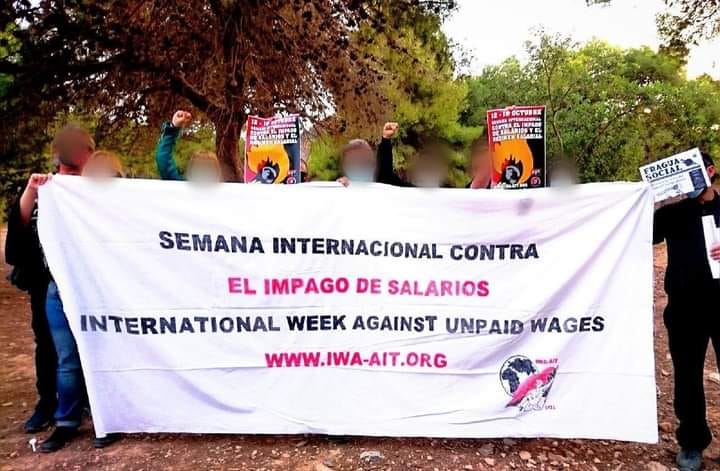
Every year in October, the sections of the IWA (International Workers Association organize an International week-of struggle against unpaid wages. In fact, unpaid wages are a year-round problem, and it’s all year long that we fight alongside workers for their most basic right: that the boss should simply give them what they’re owed. But this week is also an opportunity to highlight our day-to-day militant action, which we usually carry out without giving it any publicity.
While demanding to be paid for our work isn’t revolutionary in itself, we’re trying to use a method that’s consistent with our revolutionary ideas: the method of direct action. Contrary to what the Powers and the mass-media would want us believe, direct action does not mean violent action. Nor does it mean spectacular action to get our name in the newsmedia front page or on social networks. As its name suggests, direct action means action taken directly by those concerned – in this case, workers – without any intermediaries, representatives or spokesperson, be they politicians (mayors, MPs, members of political parties), lawyers who decide on the plaintiff’s defense strategy, nor even union representatives who speak on behalf of the worker without first asking their opinion. Direct action may involve spectacular or even violent acts, but what characterizes direct action is that it is decided by the general assembly of those concerned, and not just by a small group of people who make decisions for the others, who are then reduced to the role of mere executors. If you think about it, a lot of what is presented to us as direct action (whether it’s the black blocs or the radical ecologist demonstrations) is not direct action, but spectacular action…
Direct action is often nothing spectacular. It starts with saying « no », as an individual, standing up to your team leader, to your department manager or to your office manager. Refusing to work overtime. Demanding to be paid on time. Nothing spectacular, nothing that will create a buzz on social networks. These are small, everyday moves, small victories that can be achieved in small steps, and that gradually build confidence in oneself and in the collective. This is not reformism (which aims to change the Law), because direct action expects nothing from the Law, Law which is merely a mediation between the parties concerned (bosses vs. workers) arbitrated by the State.
As an example of this method of direct action that we try to practice, we were contacted last week by a group of foreigners seasonal workers working in agricultural field, who were wondering about the legality of their working conditions (housing and living conditions, unpaid of wages and bonus, …), and whether they had the right to demand anything. As soon as we received their request, we offered to meet with them to discuss what could be done collectively. We carried out a legal analysis of their requests, drawing on the network of fellow mates who have solid experience of these issues, either as activists or through their professional activity (labor inspectorate). It turned out that, in fact, most of the points raised by the seasonal workers were not « illegal ». The boss was exploiting them, but as legally as possible! It was morally iniquitous, but completely in line with the sacrosanct Labour Code. After explaining this to the workers, we also told them that there was nothing to stop them from asking for more than what was stipulated in the Labor Code. And that to give ourselves the best chance of winning, it was preferable to act collectively, in a grouped manner and without designating a particular interlocutor to the boss, to avoid designating a target on which to bring repression to bear. The seasonal workers have already put this method into practice and it has already enabled them to obtain a washing machine for their clothes. It’s a great way to earn back wages, because you don’t have to pay at the launderette to wash your clothes. It may seem pidding, but being able to put on clean clothes when you’re working in the crops is a question of dignity. And revolutions are often – if not always – fought for reasons of dignity, far more than for any other strictly material reason.
In conclusion, here’s the note sent to us by the compañera who had contacted us on behalf of the group:
« I’d like to thank you for reminding me that it’s only fair that I should claim the Patrones (women boss) for certain things in exchange for my labor power, even if the law doesn’t require it. I still have problems with the bosses, and sometimes also with my colleagues who tell me I’m « too demanding » (even though we have super super precarious conditions in my opinion) and that sometimes makes me lower my standards.
If I come back to work in the region, of course I’ll contact you to join you and cooperate with you. »
The fight goes on…
CNT-AIT activists
to contact CNT-AIT France :
contact@cnt-ait.info
To contact International Workers Association :
secretariado@iwa-ait.org
http://iwa-ait.org
En français : Semaine internationale de lutte contre les salaires impayés : un exemple d’action directe au quotidien
http://cnt-ait.info/2023/10/20/semaine-internationale-payment/
In English: International week against unpaid wages: an example of daily direct action
http://cnt-ait.info/2023/10/20/international-week-23/
En Español:Semana internacional contra el impago de salarios : un ejemplo de acción directa cotidiana
http://cnt-ait.info/2023/10/20/semana-internacional-23/